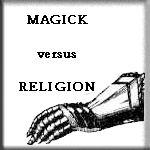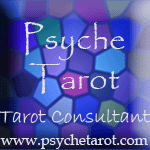Magick versus religion
By Psyche | June 8, 2010
 Over on The Great Tinines, Johnny Rapture1 asks “Who’s Pagan?“, inviting readers to post their definitions and lists of groups who qualify. I offered my definition, and in the course of discussion cartwheel asserted that:
Over on The Great Tinines, Johnny Rapture1 asks “Who’s Pagan?“, inviting readers to post their definitions and lists of groups who qualify. I offered my definition, and in the course of discussion cartwheel asserted that:
No distinction between “magic” on the one hand and “religion” on the other has ever been made successfully.
This sounds like a challenge! The gauntlet has been thrown.
Back in 2008 we looked at various definitions of magick, but I still believe Crowley’s remains the most elegant:
Magick is the Art and Science of causing change in conformity with Will.
This simple statement was further clarified by an extract from Magick Without Tears:
Magick is the Science of understanding oneself and one’s conditions. It is the Art of applying that understanding in action.
This firmly places the onus of on the magus hirself. Whatever model one is using: spiritual, energetic, psychological, cybernetic or meta – it is the responsibility of the magickian to effect change.
Religion, on the other hand, relies on a relationship between the individual and some form of external supernatural power (think Wicca, Sentianism, kaballah).
It’s true, magick can be practiced within a spiritual framework, often in tandem with religion, but it is by no means necessary and conflation of the two is in no way desirable.
cartwheel raised an interesting question. This distinction works for me, what are your thoughts on this?
Footnotes:
- Great name. [back]
Related posts:
- 100 Years of Fringe Religion: Thelema, Discordianism, Wicca, Satanism and…Atheism?
- Definitions of magick
- What do we mean by “magick”?
- Feedback on definitions of magick and what we mean
- Magick, myth and change
Category: Essays & Opinion, Magick
Save & Share: Del.icio.us Digg Facebook Reddit Stumble it! Twitter





I admit I’m intrigued – since you’ve defined magick for the purposes of this discussion, would you mind defining religion also? I appreciate that you have said, and I agree with:
“Religion, on the other hand, relies on a relationship between the individual and some form of external supernatural power (think Wicca, Sentianism, kaballah).”
Doesn’t the spirit model also do this? If so, how does one render it separate from religion? There is a case for the notion of appeasement rites being magick in effort to affect change after all, isn’t there
Would you mind unpacking what is *distinctly* unique about religion in your view?
At its simlpest, I see religion as the codified veneration of an external supernatural entity.
The distinction is in the veneration, rather than the working relationship implied in servitor creation, for example, that makes religion one thing, and practical magick another.
Personally, I practice both magic and religion, one inside the other, alternating which inside which depending on circumstances. To me, both rely on human spiritual skills to get the jobs done. While some religions deny this on a doctrinal basis, I don’t consider ‘beliefs’ to be a key part of religion – religion is what you *do*. To the extent that ‘believing’ is a verb, one might include that, but many religions don’t require specific beliefs at all, just specific practices. I have two definitions I use
1: magic is the use of spiritual skills for personally willed goals.
2: Religions are specific systems intended to connect humans with the divine.
In that way I tend to see religion as a subset of magic – a specific set of skills applied for the willed purpose of building relationship with the divine. Since most humans don’t care enough about spiritual (or whatever) stuff to actually do much work about it, religions attempt to give a simple blessing in turn for simple practice, like attending rites.
That’s enough for now, I’m sure…
Do you differentiate between spirituality and religion?
I consider myself a very spiritual person, and also a firm atheist. “Connecting” with the divine isn’t terribly important to me, but creating a sense of it is.
To me, spirituality is one’s personal habit of interacting with spirit. For many (maybe most) spiritual folk that happens as a result of practicing religion. I’m not terribly concerned with whether the divine pre-exists the human mind or is a result of it. I *do* think it’s useful to conceive the divine as composed of persons, rather than impersonal forces. I understand ‘worship’ to be respectful interaction with those persons.
I take it that when you say ‘atheist’ you don’t mean ‘positivistic materialist’ (otherwise magic would be out, eh?). Is it that you just don’t think there are any non-material persons to relate with? Or are you just rejecting the notion of ‘God’ as all-powerful owner-operator of the cosmos. If the latter, then I agree – as a polytheist I hold that no one is in charge.
By atheist I mean atheist – one who does not believe in any gods.
I recently contributed a brief essay to RendingtheVeil.com where I used Frater U.:D.:’s five models theory to explore other methods of magickal belief. Only one model, the spirit model, requires a belief in spirits, gods or entities of any kind.
This was published in response to feedback I received regarding my response to a hysterical essay by Donald Tyson, which proclaimed atheism as “the enemy”.
See Tyson’s “Atheism – The Real Enemy“, and my response with a more accurate representation of atheism: “Ignorance – The Real Enemy“, and my follow up post “Differing Models, for more.
[...] Synchronicity is alive and well and living in West London [...]